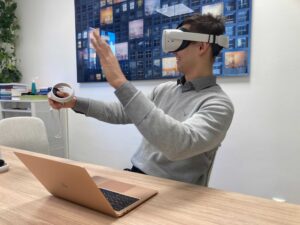In the future, will coaching be completely digital? Or will face-to-face coaching remain relevant? Technology is advancing rapidly, and new methods emerge consistently. With the Covid-19 outbreak in 2020, digital coaching increased faster than ever before, online meetings became the new normal.
Ten years ago, video conferencing was already starting to grow, but the idea that people would choose to meet that way rather than in-person or over the phone seemed strange.
The difference between digital coaching and traditional coaching
In traditional coaching, coaches meet face-to-face with clients. In this case, clients have to select coaches within a certain geographic area. Unlike face-to-face coaching, digital coaching gives you all the benefits of traditional coaching, but with a broader choice of coaches. Instead of being limited to coaches in your area, you have now the possibility to choose between coaches all over the world. Additionally, travel costs are reduced significantly, and schedules are more easily accommodated.
Digital communication offers real-time feedback, easy access, and an instant gateway to a global audience. Also, digital and virtual coaching provides a safe space to discuss your goals and challenges. The slight distance can make it easier for some people to be even more honest.
Research shows that digital coaching is equally effective as in-person coaching. It turns out that it’s facetime that is crucial to getting effective coaching results. Just like with in-person sessions, the key is to build a trusting relationship with clients. Instinctive human communication methods like eye contact, facial expressions and empathetic body language are all possible in the digital space. All it takes is the right technology and a solid internet connection. It’s the coach, tools, and relationship with their clients that will help them achieve success, whether sessions are in person or digital.
Virtual coaching
A few weeks ago, we rented two VR Oculus Quest 2 that is a virtual reality (VR) headset created by Facebook Technologies. This virtual headset creates shared digital spaces over the internet. You can walk around these virtual environments and interact with objects inside of them while joined by other people from anywhere in the world.
Perhaps one day VR coaching will move from being strange to being normal, just as Skype did ten years ago.

We wanted to conduct a coaching session in a virtual world in which the coach and client both appear as avatars, meeting in an office. Although some technical challenges arose, we were eventually able to start the experiment. Some of us developed motion sickness after a while, which can be a side effect of this type of activity. But maybe if you get used to having this headset – the motions sickness will go away.
It was a fun and interesting experience and very different from actually meeting face-to-face. One of our coaches, Johanna Gartz coached Conor Bliss.
“The experience was unusual, but it gave me ideas for how to use coaching in new ways. For example, instead of the client just having to think into their vision, they can actually place themselves in it and experience more concretely how it feels”
This article was written by:
Hanna Bladin


